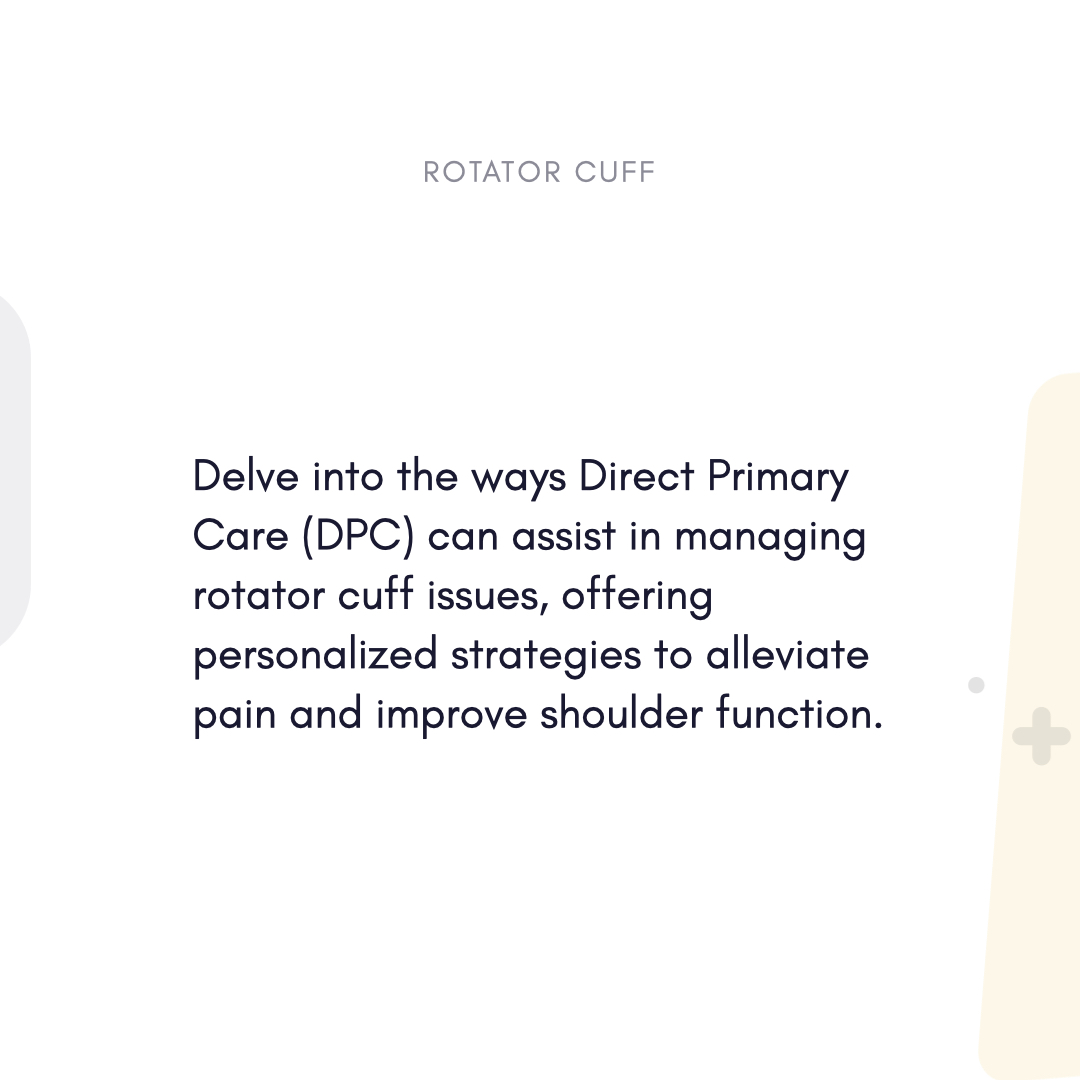Rotator Cuff Injuries and Direct Primary Care (DPC): Personalized Care to Restore Shoulder Function
A sharp ache as one reaches higher. Spending nights on your "good side." This shoulder injury limits work, sports, and sleep for 2 million+ individuals yearly who have rotator cuff tears. Although traditional treatment sometimes postpones MRIs or pushes surgery, there is hope: direct primary care (DPC) offers a proactive, patient-centered approach to heal your shoulder and prevent the OR.

Understanding Rotator Cuff Injuries
The rotator cuff—supraspinatus, infraspinatus, teres minor, subscapularis—may be injured:
- In tendinitis: inflammation brought on by overuse
- Tears, both partial and full: Either acute damage or degenerative wear.
- Impact: Pinching as you raise your arms
Typical symptoms include:
- Shoulder pain during rest or at night
- Weakness rotating or lifting the arm
- Restricted range of motion
Therapeutic risks: Frozen shoulder, ongoing pain, muscle shrinkage For most tears, the American Academy of Orthopaedic Surgeons advised early conservative treatment.
DPC Changes Rotator Cuff Maintenance
Operating on a membership model usually between 50 USD and 150 USD per month, Direct Primary Care (DPC) provides unlimited access to your doctor for a set price. For shoulder patients, this translates to no prior authorization, no co-pays, and a treatment plan as exact as your MRI.
1. Imaging and Fast Diagnosis
The transparent approach of DPC guarantees:
- Physical exams same-day: empty can tests, Neer's, Hawkins', etc.
- Reasonably priced imaging Confirm tear extent with cash-pay MRI (400 USD vs. 2,500 USD).
- For inflammation, corticosteroids or PRP guided by ultrasound.
2. Individualized, Guideline-driven Treatment
DPC doctors design customized programs compliant with AAOS recommendations:
- Non-surgical treatment:
- Phase 1: Rest; ice; NSAIDs
- Phase 2: scapular stabilization and rotator cuff strengthening PT
- Phase 3: Gradual activity with form correction returns to work.
- Referrals for arthroscopic repairs should follow if conservative approaches prove insufficient.
3. Comprehensive, Economical Assistance
DPC lowers physical and financial burden by:
- Meloxicam or gabapentin has wholesale pricing that helps to cut medicine costs.
- 24-hour telehealth access: Control of pain flares or post-injection issues.
- Preventive education: shoulder-friendly workouts, ergonomic tweaks.
DPC advantages for rotator cuff patients
1. Inappropriate Accessibility
- Consultations around-the-clock for acute injuries or post-operative recovery.
- No waiting for imaging or PT referrals.
2. Individualized Interventions
- Athletes: Rehab tailored to their sport (swimming, throwing).
- Degenerative tears: ultrasonic treatment and collagen pills.
3. Open Cost: Affordability
- Included are consultations, imaging reviews, and care coordination under membership.
- Typical savings: 3,000 USD+ by not paying ER visits or PT co-pays.
Personal Success Stories from Real Life
- Case 1: Using DPC's PRP injections and 12-week PT, 45-year-old Sarah skipped surgery. Pain-free now, and gardening once more.
- Case 2: DPC-coordinated arthroscopy was done on Mike, 55, who had a full-thickness rip. Six months later, full range restored.
Frequently asked questions: DPC and Rotator Cuffs
- Q: Can DPC handle large tears requiring reverse TSA?
- A: Surely. DPC works with prehab programs and top surgeons.
- Q: Without insurance, is DPC reasonably priced?
- A: Right away. Paying 50 USD a session instead of 150 USD, members save on MRI and PT.
- Q: Regarding workers' comp cases, what comes next?
- A: DPC arranges accelerated care and modified duty plans in cooperation with companies.
Why DPC Wins for Shoulder Patients?
Emphasizing DPC's adherence to rehabilitation guidelines, the American Physical Therapy Association supports:
- Precision: Customizing PT to match either partial or whole tear type.
- Tools to monitor development and stop re-injury help empower you.
- Trust: Replacing scattered, impersonal visits is a consistent care team.
Recover Your Shoulder, Take Back Your Life
Rotator cuff injuries do not have to bench you indefinitely. Every day, DPC helps you to find a partner who treats holistically, listens closely, and walks with you from injury to full recovery.






